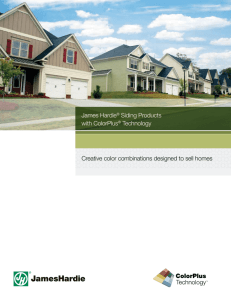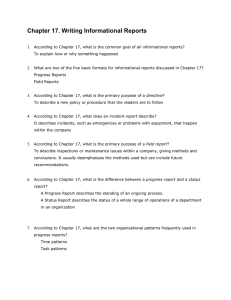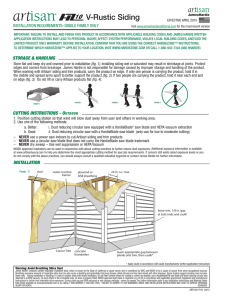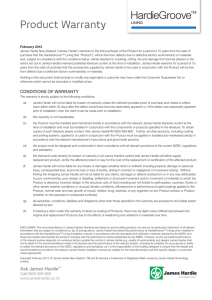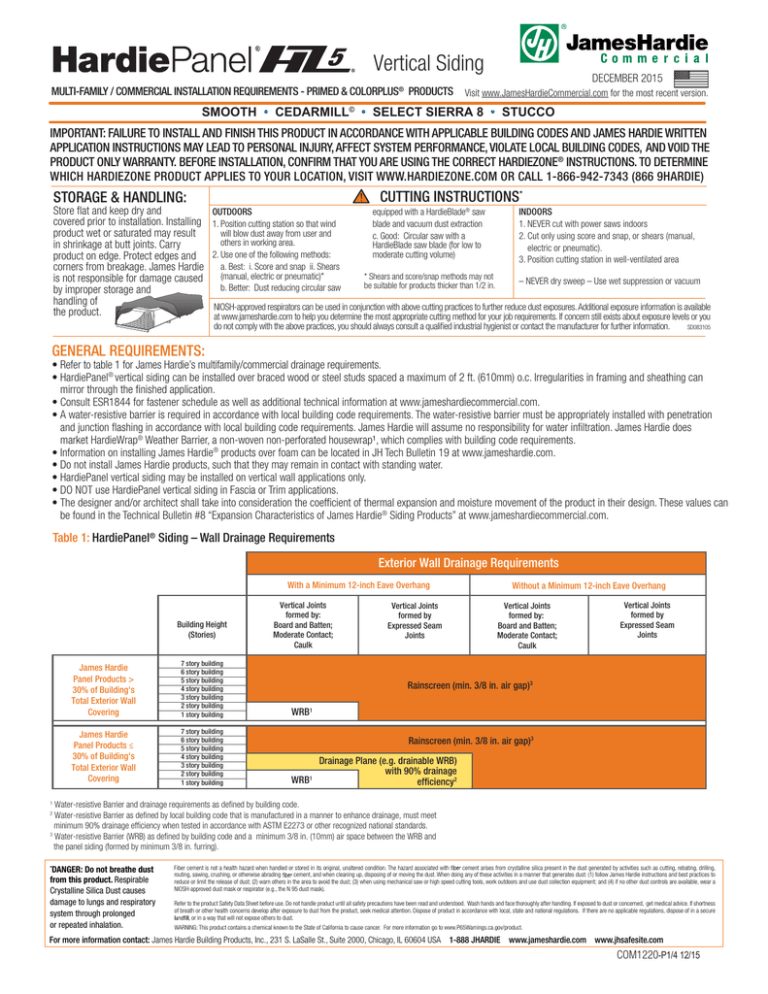
Vertical Siding
MULTI-FAMILY / COMMERCIAL INSTALLATION REQUIREMENTS - PRIMED & COLORPLUS® PRODUCTS
DECEMBER 2015
Visit www.JamesHardieCommercial.com for the most recent version.
SMOOTH • CEDARMILL© • SELECT SIERRA 8 • STUCCO
IMPORTANT: FAILURE TO INSTALL AND FINISH THIS PRODUCT IN ACCORDANCE WITH APPLICABLE BUILDING CODES AND JAMES HARDIE WRITTEN
APPLICATION INSTRUCTIONS MAY LEAD TO PERSONAL INJURY, AFFECT SYSTEM PERFORMANCE, VIOLATE LOCAL BUILDING CODES, AND VOID THE
PRODUCT ONLY WARRANTY. BEFORE INSTALLATION, CONFIRM THAT YOU ARE USING THE CORRECT HARDIEZONE® INSTRUCTIONS. TO DETERMINE
WHICH HARDIEZONE PRODUCT APPLIES TO YOUR LOCATION, VISIT WWW.HARDIEZONE.COM OR CALL 1-866-942-7343 (866 9HARDIE)
CUTTING INSTRUCTIONS*
STORAGE & HANDLING:
Store flat and keep dry and
covered prior to installation. Installing
product wet or saturated may result
in shrinkage at butt joints. Carry
product on edge. Protect edges and
corners from breakage. James Hardie
is not responsible for damage caused
by improper storage and
handling of
the product.
OUTDOORS
1. Position cutting station so that wind
will blow dust away from user and
others in working area.
2. Use one of the following methods:
a. Best: i. Score and snap ii. Shears
(manual, electric or pneumatic)*
b. Better: Dust reducing circular saw
equipped with a HardieBlade® saw
blade and vacuum dust extraction
c. Good: Circular saw with a
HardieBlade saw blade (for low to
moderate cutting volume)
* Shears and score/snap methods may not
be suitable for products thicker than 1/2 in.
INDOORS
1. NEVER cut with power saws indoors
2. Cut only using score and snap, or shears (manual,
electric or pneumatic).
3. Position cutting station in well-ventilated area
– NEVER dry sweep – Use wet suppression or vacuum
NIOSH-approved respirators can be used in conjunction with above cutting practices to further reduce dust exposures. Additional exposure information is available
at www.jameshardie.com to help you determine the most appropriate cutting method for your job requirements. If concern still exists about exposure levels or you
do not comply with the above practices, you should always consult a qualified industrial hygienist or contact the manufacturer for further information.
SD083105
GENERAL REQUIREMENTS:
• Refer to table 1 for James Hardie’s multifamily/commercial drainage requirements.
• HardiePanel® vertical siding can be installed over braced wood or steel studs spaced a maximum of 2 ft. (610mm) o.c. Irregularities in framing and sheathing can
mirror through the finished application.
• Consult ESR1844 for fastener schedule as well as additional technical information at www.jameshardiecommercial.com.
• A water-resistive barrier is required in accordance with local building code requirements. The water-resistive barrier must be appropriately installed with penetration
and junction flashing in accordance with local building code requirements. James Hardie will assume no responsibility for water infiltration. James Hardie does
market HardieWrap® Weather Barrier, a non-woven non-perforated housewrap¹, which complies with building code requirements.
• Information on installing James Hardie® products over foam can be located in JH Tech Bulletin 19 at www.jameshardie.com.
• Do not install James Hardie products, such that they may remain in contact with standing water.
• HardiePanel vertical siding may be installed on vertical wall applications only.
• DO NOT use HardiePanel vertical siding in Fascia or Trim applications.
• The designer and/or architect shall take into consideration the coefficient of thermal expansion and moisture movement of the product in their design. These values can
be found in the Technical Bulletin #8 “Expansion Characteristics of James Hardie® Siding Products” at www.jameshardiecommercial.com.
Table 1: HardiePanel® Siding – Wall Drainage Requirements
Exterior Wall Drainage Requirements
With a Minimum 12-inch Eave Overhang
Building Height
(Stories)
James Hardie
Panel Products >
30% of Building's
Total Exterior Wall
Covering
7 story building
6 story building
5 story building
4 story building
3 story building
2 story building
1 story building
James Hardie
Panel Products ≤
30% of Building's
Total Exterior Wall
Covering
7 story building
6 story building
5 story building
4 story building
3 story building
2 story building
1 story building
Vertical Joints
formed by:
Board and Batten;
Moderate Contact;
Caulk
Vertical Joints
formed by
Expressed Seam
Joints
Without a Minimum 12-inch Eave Overhang
Vertical Joints
formed by:
Board and Batten;
Moderate Contact;
Caulk
Vertical Joints
formed by
Expressed Seam
Joints
Rainscreen (min. 3/8 in. air gap)3
WRB1
Rainscreen (min. 3/8 in. air gap)3
Drainage Plane (e.g. drainable WRB)
with 90% drainage
WRB
efficiency2
1
Water-resistive Barrier and drainage requirements as defined by building code.
Water-resistive Barrier as defined by local building code that is manufactured in a manner to enhance drainage, must meet
minimum 90% drainage efficiency when tested in accordance with ASTM E2273 or other recognized national standards.
3
Water-resistive Barrier (WRB) as defined by building code and a minimum 3/8 in. (10mm) air space between the WRB and
the panel siding (formed by minimum 3/8 in. furring).
1
2
DANGER: Do not breathe dust
from this product. Respirable
Crystalline Silica Dust causes
damage to lungs and respiratory
system through prolonged
or repeated inhalation.
*
Fiber cement is not a health hazard when handled or stored in its original, unaltered condition. The hazard associated with
cement arises from crystalline silica present in the dust generated by activities such as cutting, rebating, drilling,
cement, and when cleaning up, disposing of or moving the dust. When doing any of these activities in a manner that generates dust: (1) follow James Hardie instructions and best practices to
routing, sawing, crushing, or otherwise abrading
reduce or limit the release of dust; (2) warn others in the area to avoid the dust; (3) when using mechanical saw or high speed cutting tools, work outdoors and use dust collection equipment; and (4) if no other dust controls are available, wear a
NIOSH-approved dust mask or respirator (e.g., the N 95 dust mask).
Refer to the product Safety Data Sheet before use. Do not handle product until all safety precautions have been read and understood. Wash hands and face thoroughly after handling. If exposed to dust or concerned, get medical advice. If shortness
of breath or other health concerns develop after exposure to dust from the product, seek medical attention. Dispose of product in accordance with local, state and national regulations. If there are no applicable regulations, dispose of in a secure
or in a way that will not expose others to dust.
WARNING: This product contains a chemical known to the State of California to cause cancer. For more information go to www.P65Warnings.ca.gov/product.
For more information contact: James Hardie Building Products, Inc., 231 S. LaSalle St., Suite 2000, Chicago, IL 60604 USA 1-888 JHARDIE www.jameshardie.com www.jhsafesite.com
COM1220-P1/4 12/15
INSTALLATION:
• HardiePanel vertical siding must be joined on stud.
• Position fasteners 3/8 in. (9.5mm) from panel edges and no closer than 2 in. (50mm) away from corners.
JOINT TREATMENT
• Vertical Joints - Install panels in moderate contact (fig. 1); alternatively joints may also be covered with battens or caulked (Not applicable to ColorPlus® Finish) (fig. 2).
• Horizontal Joints - Provide positive slope Z-flashing at all horizontal joints (fig. 3).
Refer to Table 1 for correct installation condition
Water Resistive Barrier Condition
Figure 2
stud
Figure 1
water-resistive
barrier***
stud
water-resistive
barrier***
HardiePanel
siding
keep nails
3/8 in. (9.5mm) min.
from panel
edges
Batten Joint
leave appropriate gap between
panels, then caulk*
(Not applicable to ColorPlus® Finish)
Drainage Plane/Wrap Condition
drainage
wrap***
stud
drainage wrap***
stud
HardiePanel
siding
Batten Joint
leave appropriate gap between
panels, then caulk*
Caulk Joint
moderate
contact
(Not applicable to ColorPlus® Finish)
Figure 4
3/8 in.
(9.5mm)
Recommendation: When
installing Sierra 8, provide
a double stud at panel
joints to avoid nailing
through grooves.
keep fasteners 2 in. (50mm)
away from corners
Furring/Rainscreen Condition
Do not caulk
¼ in. (6mm) gap
Z-flashing
Do not caulk
¼ in. (6mm) gap
Z-flashing
lower panel
decorative
band board
lower panel
drainage
wrap***
drainage
wrap***
upper panel
upper panel
Do not caulk
¼ in. (6mm) gap
Z-flashing
Do not caulk
¼ in. (6mm) gap
Z-flashing
lower panel
decorative
band board
lower panel
Figure 2
stud
water-resistive
barrier***
stud
furring strip**
water-resistive
barrier***
HardiePanel
siding
keep nails
3/8 in. (9.5mm) min.
from panel
edges
upper panel
Figure 3
drainage wrap***
Figure 1
upper panel
Figure 2
stud
plate
water-resistive
barrier***
Recommendation: When
installing Sierra 8, provide
a double stud at panel
joints to avoid nailing
through grooves.
keep fasteners 2 in. (50mm)
away from corners
keep nails
3/8 in. (9.5mm) min.
from panel
edges
water-resistive
barrier***
Figure 4
3/8 in.
(9.5mm)
Figure 1
Figure 3
Caulk Joint
moderate
contact
plate
water-resistive
barrier***
stud
Batten Joint
* Apply caulk in accordance with caulk manufacturer’s written
application instructions.
** Furring as prescribed in Table 1.
*** WRB or Drainage Plane as prescribed in Table 1.
leave appropriate gap between
panels, then caulk*
Caulk Joint
(Not applicable to ColorPlus® Finish)
plate
keep fasteners 2 in. (50mm)
away from corners
furring
strip**
Figure 3
furring strip**
moderate
contact
3/8 in.
(9.5mm)
water-resistive
barrier***
stud
Figure 4
Recommendation: When
installing Sierra 8, provide
a double stud at panel
joints to avoid nailing
through grooves.
upper panel
upper panel
Do not caulk
¼ in. (6mm) gap
Z-flashing
Do not caulk
¼ in. (6mm) gap
Z-flashing
lower panel
decorative
band board
lower panel
COM1220-P2/4 12/15
CLEARANCES
Maintain a minimum
Install siding and trim products in
compliance with local building code 2 in. (50mm) clearance
requirements for clearance between between James Hardie®
the bottom edge of the siding and
products and paths,
the adjacent finished grade.
steps and driveways.
Figure 5
Maintain a minimum 2 in. (50mm)
clearance between James Hardie
products and decking material.
Figure 7
siding
Figure 6
2 in.
(50mm)
min.
bottom
plate
deck material
water
resistive
barrier
2 in.
(50mm)
min.
At the juncture of the roof
and vertical surfaces,
flashing and counterflashing
shall be installed per the
roofing manufacturer’s
instructions. A minimum
2 in. (50mm) clearance
between the roofing and the
bottom edge of the siding
and trim.
Figure 8
flashing
joist
Figure 9
siding
1 in.
(25mm)
Do not bridge floors with HardiePanel siding. Horizontal joints
should always be created between floors (fig. 10).
Figure 10
Maintain a minimum 1 in.
(25mm) gap between gutter
end caps and siding & trim.
2 in.
(50mm)
min.
furring
strip
ledger
6 in.
(152mm) min.
Maintain a 1/4 in. (6mm)
clearance between the
bottom of James Hardie
products and horizontal
flashing. Do not caulk gap.
(refer to figure 3 on page 2)
fascia
gutter and end cap
WaterResistive
Barrier
KICKOUT FLASHING
Framing
Flooring
Horizontal
Trim
Step flashing
Self-adhering
membrane
Self-adhering
eaves membrane
Kickout
flashing
Drip edge
Sheathing
HardiePanel
R
Housewrap
Because of the volume of water that can pour down a sloped
roof, one of the most critical flashing details occurs where a
roof intersects a sidewall. The roof must be flashed with step
flashing. Where the roof terminates, install a kickout to deflect
water away from the siding. It is best to install a self-adhering
membrane on the wall before the subfascia and trim boards
are nailed in place, and then come back to install the kickout.
Figure 11, Kickout Flashing * To prevent water from
dumping behind the siding and the end of the roof
intersection, install a "kickout" as required by IRC code
R905.2.8.3 : “…flashing shall be a min. of 4” high and 4”
wide.” James Hardie recommends the kickout be angled
between 100° - 110° to maximize water deflection
Note: Furring shown is as a best practice or as prescribed per Table 1.
GENERAL FASTENING REQUIREMENTS
PNEUMATIC FASTENING
Fasteners must be corrosion resistant, galvanized, or stainless steel.
Electro-galvanized are acceptable but may exhibit premature corrosion. James
Hardie recommends the use of quality, hot-dipped galvanized nails. James
Hardie is not responsible for the corrosion resistance of fasteners. Stainless
steel fasteners are recommended when installing James Hardie products near
the ocean, large bodies of water, or in very humid climates.
Note: When utilizing express seam joints ensure adequate nailable
substrate width is available.
• Consult applicable code compliance report for correct fastener type and
placement to achieve specific design wind loads.
• NOTE: Published wind loads may not be applicable to all areas where Local
Building Codes have specific jurisdiction. Consult James Hardie Technical Services
if you are unsure of applicable compliance documentation.
• Drive fasteners perpendicular to siding and framing.
• Fastener heads should fit snug against siding (no air space). (fig. A)
• Do not over-drive nail heads or drive nails at an angle.
• If nail is countersunk, fill nail hole and add a nail. (fig. B)
• For wood framing, under driven nails should be hit flush to the plank with a
hammer (for steel framing, remove and replace nail).
• NOTE: Whenever a structural member is present, HardiePanel siding should be
fastened with even spacing to the structural member. The tables allowing direct
to OSB or plywood should only be used when traditional framing is not available.
• Do not use aluminum fasteners, staples, or clipped head nails.
James Hardie products can be hand nailed or fastened with a pneumatic
tool. Pneumatic fastening is highly recommended. Set air pressure so
that the fastener is driven snug with the surface of the siding. A flush
mount attachment on the pneumatic tool is recommended. This will
help control the depth the nail is driven. If setting the nail depth proves
difficult, choose a setting that under drives the nail. (Drive under driven
nails snug with a smooth faced hammer; does not apply for installation
to steel framing).
Figure A
CUT EDGE TREATMENT
Caulk, paint or prime all field cut edges. James Hardie touch-up kits are
required to touch-up ColorPlus products.
CAULKING
For best results use an Elastomeric Joint Sealant complying with ASTM
C920 Grade NS, Class 25 or higher, such as Quad Max® or a Latex Joint
Sealant complying with ASTM C834. Caulking/Sealant must be applied in
accordance with the caulking/sealant manufacturer’s written instructions.
Note: DO NOT caulk nail heads when using ColorPlus products, refer
to the ColorPlus touch-up section.
PAINTING
DO NOT use stain on James Hardie products. James Hardie products
must be painted within 180 days for primed product and 90 days for
unprimed. 100% acrylic topcoats are recommended. Do not paint when
wet. For application rates refer to paint manufacturers specifications.
Back-rolling is recommended if a paint sprayer is used.
Figure B
COM1220-P3/4 12/15
COLORPLUS® TECHNOLOGY CAULKING, TOUCH-UP & LAMINATE
• Care should be taken when handling and cutting James Hardie ColorPlus products.
• Laminate sheet must be removed immediately after installation of each course. Gently wipe any residue or construction dust left on the product
using a soft cloth.
• Touch up nicks, scrapes and nail heads using the ColorPlus Technology touch-up applicator. Touch-up should be used sparingly. If large areas
require touch-up, replace the damaged area with new HardiePanel siding with ColorPlus Technology.
• Terminate non-factory cut edges into trim where possible, and caulk. Color matched caulks are available from your ColorPlus product dealer.
• Treat all other non-factory cut edges using the ColorPlus Technology edge coaters, available from your ColorPlus product dealer.
Note: Use of touch-up on fasteners on the face of ColorPlus panels should be avoided. Do not caulk joint between ColorPlus panels.
Note: James Hardie does not warrant the usage of third party touch-up or paints used as touch-up on James Hardie ColorPlus products.
Problems with appearance or performance arising from use of third party touch-up paints or paints used as touch-up that are not James Hardie
touch-up, will not be covered under the James Hardie ColorPlus Limited Finish Warranty.
Not all designs will be suitable for every application.
PAINTING JAMES HARDIE SIDING AND TRIM PRODUCTS WITH COLORPLUS TECHNOLOGY
When repainting ColorPlus products, James Hardie recommends the following regarding surface preparation and topcoat application:
• Ensure the surface is clean, dry, and free of any dust, dirt, or mildew
• Repriming is normally not necessary
• 100% acrylic topcoats are recommended
• DO NOT use stain or oil/alkyd base paints on James Hardie products
• Apply finish coat in accordance with paint manufacturer’s written instructions regarding coverage, application methods, and application temperature
RECOGNITION: In accordance with ICC-ES Evaluation Report ESR-1844, HardiePanel vertical siding is recognized as a suitable alternate to that specified in: the 2006.2009, & 2012 International Residential Code for
One-andTwo-Family Dwellings and the 2006, 2009, & 2012 International Building Code. HardiePanel vertical siding is also recognized for application in the following: City of Los Angeles Research Report No. 24862,
State of Florida listing FL#889, Dade County, Florida NOA No. 02-0729.02, U.S. Dept. of HUD Materials Release 1263c, Texas Department of Insurance Product Evaluation EC-23, City of New York MEA 223-93-M, and
California DSA PA-019. These documents should also be consulted for additional information concerning the suitability of this product for specific applications.
© 2015 James Hardie Building Products Inc. All rights reserved.
TM, SM, and ® denote trademarks or registered trademarks of
James Hardie Technology Limited. The QUAD mark is a registered
trademark owned by Henkel Corporation.
Additional Installation and
Warranty information available at
www.jameshardie.com
COM1220-P4/4 12/15

